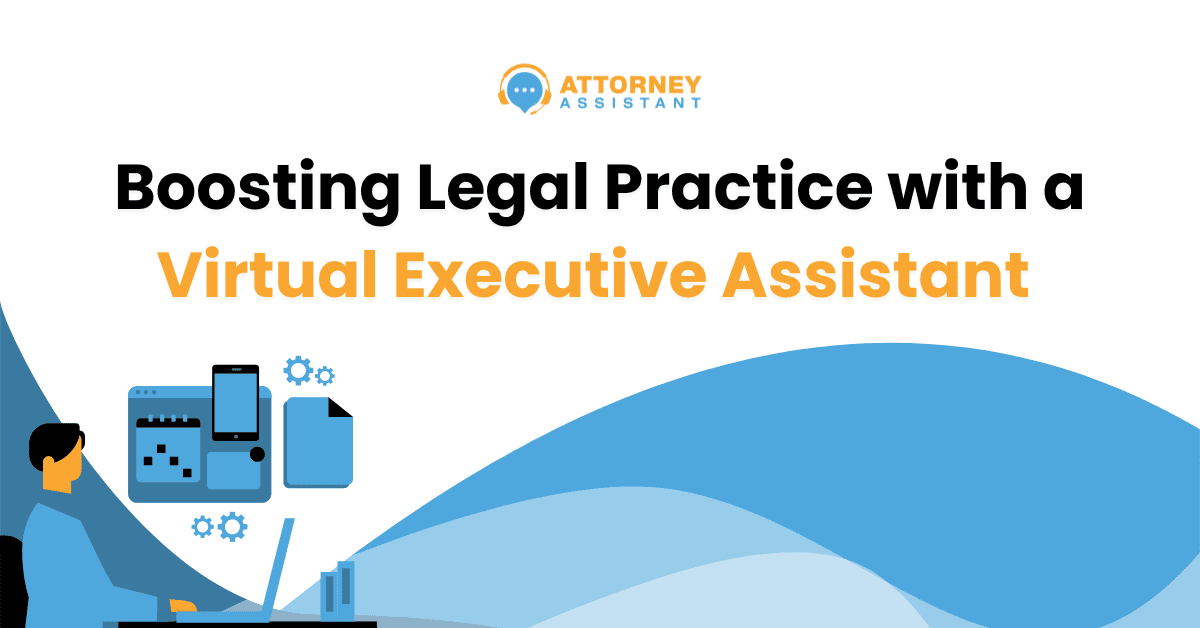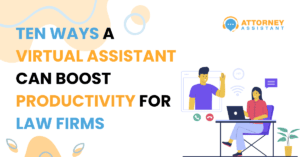In the legal world, precision, deadlines, and client relations are crucial. Having the right support can make all the difference. A virtual legal executive assistant is your key ally in managing the complexities of legal work. This role has grown as more legal professionals see the value of remote assistance. But how does a virtual legal executive assistant change your daily operations? It’s all about efficiency and prioritization. While traditional executive assistants managed physical paperwork and in-person visits, virtual legal executive assistants handle digital communications, schedule coordination, and streamline administrative tasks. This ensures every hour of your day is purposeful. Read on to see how a legal virtual executive assistant can save you time, boost your productivity, and help you work smarter in your legal practice.
What Is a Virtual Executive Assistant?
A virtual executive assistant is like a remote right-hand person for an executive. Unlike general administrative assistants who handle routine tasks for a business, a virtual executive assistant focuses on supporting a specific executive, like a CEO or VP. This role involves more than just routine administrative work. It’s about helping the executive manage their daily tasks and make decisions that boost productivity.
Think of a traditional administrative assistant as someone who handles repetitive tasks based on set processes. In contrast, a virtual executive assistant not only takes care of these tasks but may also help set up and refine the processes themselves. Traditional virtual assistants work with sales teams or back-office functions, while a virtual executive assistant is more directly involved with high-level management tasks. With their advanced skills and trustworthiness, they handle the admin tasks, allowing executives to concentrate on strategic goals.
In essence, a virtual executive assistant acts as an extension of the executive. They manage cloud-based calendars, sort through emails and social media, and keep virtual collaboration tools organized. They offer flexibility, often working part-time for multiple executives, either within the same company or across different ones.
What Is the Difference Between EA and VA?
At first glance, the role of an executive virtual assistant might look like that of a standard administrative assistant. However, the difference lies in their specialized experience and deeper insight.
Unlike other virtual assistants, executive virtual assistants are experts at adapting to the specific needs and style of their executive. They understand their executive’s goals, challenges, and preferences, and use their own organizational skills to manage tasks effectively. This means they handle decision-making, project management, and problem-solving when their executive is otherwise occupied.
Here’s what makes virtual executive assistants stand out:
- Comfortable with high-level work. They’re experienced with C-suite operations and interacting with other high-level professionals.
- Dedicated to understanding the executive. They make a long-term commitment to learning and adapting to their executive’s needs and work style.
- Enhanced judgment and independence. They bring strong problem-solving skills and can work autonomously with sound judgment.
- In-depth experience and education. They often have a strong background in business administration or management.
What Does a Virtual Executive Assistant Do?
Virtual executive assistants are a productivity powerhouse for busy executives. They manage tasks that allow executives to focus on their main responsibilities and goals. Here’s how they make a difference:
- Calendar management. They coordinate meetings, manage appointments, and handle rescheduling, so executives don’t have to deal with constant calendar updates.
- Email and phone screening. They filter out unnecessary emails and voicemails, prioritize important messages, and manage routine inquiries. This allows executives to address only the most crucial communications.
- Event planning. They handle event logistics, from booking venues to sending invitations. This ensures everything runs smoothly.
- Goal tracking. They monitor progress on personal and professional goals, helping executives stay on track with projects and supporting personal development.
- Personal tasks. They assist with personal errands like shopping for gifts, setting up personal appointments, and planning vacations, giving executives more time for what matters most.
- Professional networking. They maintain contact lists, schedule follow-ups, and track networking opportunities, ensuring important connections are maintained.
- Project management. They oversee ongoing projects, track progress, and offer insights to enhance efficiency and refine processes.
- Travel planning. They book flights, hotels, and car rentals. They also create detailed itineraries. This way, executives save time and avoid travel headaches.
What Is a Virtual Executive Legal Assistant?
Virtual executive legal assistants are remote professionals who support lawyers and law firms with various administrative and research tasks. They play a crucial role in managing daily operations, allowing attorneys to focus on their core responsibilities.
- Administrative support. Managing calendars, organizing schedules, setting up appointments, and handling reminders. They keep files organized, draft and edit correspondence and legal documents, and manage inboxes.
- Billing and administration. Creating invoices, tracking expenses, and overseeing legal databases or case management systems.
- Case management. Organizing case files, tracking deadlines, scheduling court appearances, and coordinating with other parties.
- Client communication. Acting as a point of contact for clients. They provide updates, respond to questions, and handle client requests promptly.
- Document preparation. Drafting and formatting contracts, pleadings, and agreements. They ensure documents meet legal standards and are error-free.
- Legal research. Gathering relevant statutes, rules, and resources for cases. They prepare legal arguments and asset protection strategies to help lawyers build strong cases.
- Transcription services. Transcribing meetings, depositions, or court proceedings into written records, offering accurate documentation.
By handling these essential tasks, legal virtual executive assistants free up lawyers to focus on billable work and strategic goals, offering a cost-effective alternative to hiring a full-time employee.
Why You Need a Legal Executive Virtual Assistant
In the legal world, time is always in short supply. Even with all the latest tech tools, the need for efficient admin support is constant. You might need a virtual executive legal assistant if:
- Your business growth is stalling because you’re overwhelmed with tasks.
- Your inbox and voicemail are overflowing and you can’t keep up.
- Your personal life feels neglected because you’re always working.
- Your team or clients are getting frustrated with delays.
- Your work-life balance is completely off-kilter.
A legal executive virtual assistant can be a game-changer. They help manage your day-to-day tasks, so you can focus on high-priority legal work. Here’s how:
- Boosted productivity. By taking care of administrative tasks like scheduling, document management, and correspondence, virtual assistants free up your attorneys to focus on billable work, client issues, and strategic planning.
- Cost savings. A virtual legal executive assistant helps trim costs by cutting out the need for office space, equipment, and employee benefits. You only pay for the hours they work, which keeps overhead expenses low.
- Enhanced client service. Virtual assistants manage client communication efficiently, keep client files and databases organized, and help improve client satisfaction and loyalty.
- Flexibility and scalability. You can hire a virtual assistant based on your needs, whether for busy times, special projects, or part-time work. This flexibility lets you adjust your support staff to fit your workload perfectly.
- Global talent and 24/7 support. With virtual assistants from around the globe, you can tap into a diverse talent pool and benefit from round-the-clock support, ensuring responsiveness to clients regardless of their location or time zone.
- Specialized skills. Legal virtual assistants bring expertise in legal research, document preparation, and client communication. You get high-level skills without the hassle of extensive training.
Hiring a virtual executive legal assistant can significantly cut costs, increase productivity, and improve client service, allowing your law firm to thrive and expand.
Key Qualities to Look for in a Virtual Executive Legal Assistant
Finding the right virtual executive legal assistant can boost your firm’s efficiency. Here are the key qualities to consider:
- Adaptability and continuous learning. Flexibility to handle changing priorities and challenges is crucial. They should be eager to learn, stay updated on legal trends and technologies, and work independently in a fast-paced environment.
- Communication and interpersonal skills. Excellent written and verbal communication is vital for drafting correspondence and interacting with clients and attorneys. They should explain complex legal concepts clearly and build strong relationships with diverse people.
- Confidentiality and ethics. Maintaining client confidentiality and discretion with sensitive information is essential. They should understand legal ethics and professional responsibility.
- Document preparation and proofreading. Your assistant should excel at drafting contracts, pleadings, and other legal documents. Attention to detail and strong proofreading skills ensure documents are clear, accurate, and properly formatted.
- Legal knowledge and research skills. Look for someone well-versed in legal terminology, procedures, and best practices. They should be skilled at conducting thorough legal research and understanding relevant laws and court rules.
- Time management and organizational skills. Outstanding time management and organizational skills are a must. They should handle multiple projects and deadlines efficiently while keeping files and records meticulously organized.
How to Find the Right Virtual Executive Legal Assistant
Finding the right virtual legal executive assistant involves several key steps:
- Define your needs. Identify the specific tasks you need help with, such as legal research, document preparation, client communication, or administrative support. Clear needs will help you find a candidate with the right skill set.
- Vet candidates thoroughly. Check qualifications by reviewing their experience and asking for references. Assess soft skills like communication, project management, and personality fit to ensure effective collaboration.
- Explore hiring options. Decide whether to hire an independent assistant or work with a staffing agency, which specialize in legal staffing and provide vetted candidates.
- Conduct interviews. Interview shortlisted candidates to assess their legal knowledge, experience with legal software, and ability to handle tasks relevant to your practice.
- Trial period. Start with a trial period to see how well the assistant integrates into your workflow and handles tasks. This helps you evaluate their performance before committing long-term.
- Provide clear onboarding. Once hired, give clear instructions and resources to help your assistant understand your processes and expectations for a smooth transition.
By following these steps, you can find a virtual legal executive assistant who meets your needs and boosts your practice’s productivity.
Cost of a Virtual Executive Legal Assistant
The cost of hiring a virtual executive legal assistant varies based on location and hiring method. Here’s a quick guide to your options:
- Agency hire. Agencies pre-screen candidates and match you with the right assistant. You’ll pay more due to agency fees, but it saves time and effort. However, you’ll still need to manage training and performance.
- Direct hire. Hiring directly, whether part-time or freelance, is usually the most cost-effective, especially if the assistant is based overseas. However, you’ll handle recruitment, training, and management yourself, and ensure they securely handle sensitive information.
- Freelance marketplaces. Platforms like Upwork are great for finding freelancers for task-based work but may not be suitable for high-level executive support. If you need specialized legal help, this might not be the best fit.
- Managed service. This option provides the most support, including recruiting, training, and managing the assistant. It usually comes with a dedicated account manager and backup assistant. While more expensive, it’s ideal if you want minimal management and reliable support.
The best choice depends on your needs, budget, and how much time you can spend managing the assistant.
Getting Started with Attorney Assistant
In the modern legal environment, virtual executive legal assistants are a necessity, not just a convenience. They can significantly boost an executive’s productivity and efficiency. At Attorney Assistant, we know how crucial it is to find the right fit for your team. Our managed service is designed to be flexible and hassle-free. Just tell us what you need, and we’ll find the perfect candidate for you. Our screening process ensures you get the best in both skills and attitude. Ready to see the benefits? Schedule a call with us today to get started.






